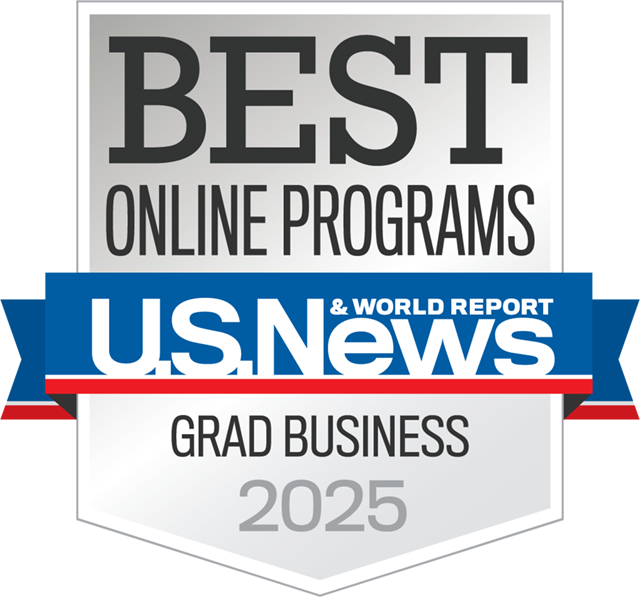100% Online
Complete your Penn State course work at your own pace and 100% online.
Application deadline
Credits and costs
Nationally Recognized

Gain Finance Skills to Address the Evolving Market Environment
Promote global diversification of financial portfolios to maximize return on investment.
Manage the risk exposure to fluctuations of interest and exchange rates.
Address current financial challenges and future trends using financial data.
Identify and evaluate solutions to portfolio management problems facing your organization using financial analysis.
Evaluate the ethical and societal implications of financial decision-making.
Online Finance Courses
Online Finance Courses
The courses in the 33-credit online Master of Finance program are designed to provide you with a body of knowledge on financial accounting theory, quantitative methods, corporate financial modeling, financial and speculative markets, and multinational finance.
As a student in the finance degree program, you can learn about:
- financial modeling, including capital budgeting, basic statistics, and forecasting
- financial accounting and its underlying principles for decision-making
- advanced topics involving strategic financial decision-making, including capital structure and cost of capital, valuation, and corporate control
- multinational financial management and different tax regulations in foreign countries
- financial derivative securities covering options, forwards, futures, and OTC derivatives
As you progress through your course work, you can develop additional expertise in corporate finance and investments. A 3-credit capstone course provides a culminating experience for you to develop your analytical abilities to identify strategies that enhance value creation by building on knowledge you have acquired from the core courses.
Your cohort will follow a predetermined schedule of courses. If you have questions about the cohort course schedule, please reach out to [email protected].
Required Courses (30 credits)
- 3credits
Measurement and reporting of financial information for external purposes, with particular attention to current problems in asset and income measurement.
- 3credits
This course provides a foundation in finance from the perspective of the firm. The objective is to show students that basic financial principles can be useful no matter the type of job.
- 3credits
The course is designed to expand the student's knowledge of the broad field of financial and investment analysis.
- 3credits
Study of quantitative methods used in financial and investment analysis and modeling.
- 3credits
Finance topics involving strategic financial decisions, including capital structure and cost of capital, financial forecasting, valuation, and corporate control.
- 3credits
This course focuses on the various income securities including bonds, mortgage-backed securities, asset-backed securities, interest rate derivatives, and credit derivatives.
- 3credits
Survey of drivers of success in M&A and develop knowledge and skills in the design and evaluation of M&A transactions.
- 3credits
Analysis of the international aspects of managerial finance. Emphasis on the environmental and institutional factors influencing capital acquisition and allocation.
- 3credits
Analysis of factors affecting price determination in financial markets.
- 3credits
Analysis of derivative securities covering options, forwards, futures, OTC derivatives; topics include valuation, trading, hedging. Involves computer analysis.
Culminating Experience (3 credits)
- 3credits
Focuses on the analysis and valuation of a firm's equity securities in the financial market using a fundamental analysis. The course integrates topics discussed in various finance courses to help students to develop their analytical ability to identify strategies that enhance value creation.
Course Availability
If you're ready to see when your courses will be offered, visit our public LionPATH course search (opens in new window) to start planning ahead.
Start or Advance Your Finance Career

Start or Advance Your Finance Career
You can use the knowledge gained from this advanced degree program and the support of Penn State career resources to pursue your career goals in a variety of fields.
Job Titles Related to This Degree
The following roles are often held by people with this type of degree:
- Chief Financial Officer (CFO)
- Corporate Controller
- Credit Administration Manager
- Financial Analyst
- Financial Center Manager
Employment Outlook for Occupational Fields Related to This Degree
Estimates of employment growth and total employment are provided by the U.S. Bureau of Labor Statistics and are subject to change. While these occupations are often pursued by graduates with this degree, individual outcomes may vary depending on a variety of factors. Penn State World Campus cannot guarantee employment in a given occupation.
Financial Managers
Financial and Investment Analysts
Chief Executives
Career Services to Set You Up for Success

From the day you're accepted as a student, you can access resources and tools provided by Penn State World Campus Career Services to further your career. These resources are beneficial whether you're searching for a job or advancing in an established career.
- Opportunities to connect with employers
- Career counselor/coach support
- Occupation and salary information
- Internships
- Graduate school resources
Ready to Learn More?
Get the resources you need to make informed decisions about your education. Request information on this program and other programs of interest by completing this form.
Ready to take the next step toward your Penn State master's degree?
Costs and Financial Aid
Costs and Financial Aid
Learn about this program's tuition, fees, scholarship opportunities, grants, payment options, and military benefits.
Graduate Tuition
Graduate tuition is calculated based on the number of credits for which you register. Tuition is due shortly after each semester begins and rates are assessed every semester of enrollment.
2024–25 Academic Year Rates
| How many credits do you plan to take per semester? | Cost |
|---|---|
| 11 or fewer | $1,067 per credit |
| 12 or more | $12,805 per semester |
2025–26 Academic Year Rates
| How many credits do you plan to take per semester? | Cost |
|---|---|
| 11 or fewer | $1,078 per credit |
| 12 or more | $12,933 per semester |
Financial Aid and Military Benefits
Some students may qualify for financial aid. Take the time to research financial aid, scholarships, and payment options as you prepare to apply. Federal financial aid may only be used to pay for credits used to satisfy program requirements.
Military service members, veterans, and their spouses or dependents should explore these potential military education benefits and financial aid opportunities, as well.
Additional Cost of Attendance Details
To view the detailed list of cost of attendance elements:
- visit the Tuition Information site
- click the plus sign to expand the table
- select a semester from the World Campus row
Technical Requirements
Review the technical requirements for this program.
Who Should Apply?
This program is designed for individuals who are interested in careers as financial professionals in financial institutions or investment management and who have completed some course work in business statistics, financial management/corporate finance, and microeconomics.
AACSB Accredited

This well-respected graduate degree program is offered by AACSB–accredited Penn State Great Valley. The course work can help to prepare you for various professional certifications, such as the Chartered Financial Analyst® (CFA®) certification.
Benefits of a Cohort Model
Benefits of a Cohort Model
Penn State's online master's degree program in finance uses a cohort model in which all students in the cohort begin the program at the same time and progress through the courses together.
The cohort model facilitates collaborative teamwork so that you can build relationships and network with other high-caliber individuals in the program, even while learning at a distance. It also allows the program course content to be integrated across courses so that you can learn to address the same financial scenarios from multiple perspectives.
How Quickly Can I Earn this Degree?
Along with your cohort, you will take two consecutive courses in the fall and spring semesters, one course in the first-year summer semester, and two courses in the second-year summer semester to complete your degree in two years.
Convenient Online Format
This program's convenient online format gives you the flexibility you need to study around your busy schedule. You can skip the lengthy commute without sacrificing the quality of your education and prepare yourself for more rewarding career opportunities without leaving your home.
A Trusted Leader in Online Education

Penn State has a history of more than 100 years of distance education, and World Campus has been a leader in online learning for more than two decades. Our online learning environment offers the same quality education that our students experience on campus.
How to Apply to Penn State

How to Apply to Penn State
Apply by July 20 to start August 25
Application Instructions
Deadlines and Important Dates
Complete your application and submit all required materials by the appropriate deadline. Your deadline will depend on the semester you plan to start your courses.
Fall Deadline
Apply by July 20 to start August 25Spring Deadline
Apply by November 20 to start January 12
Steps to Apply
For admission to the J. Jeffrey and Ann Marie Fox Graduate School, an applicant must hold either (1) a baccalaureate degree from a regionally accredited U.S. institution or (2) a tertiary (postsecondary) degree that is deemed comparable to a four-year bachelor's degree from a regionally accredited U.S. institution. This degree must be from an officially recognized degree-granting institution in the country in which it operates.
GPA — An undergraduate cumulative grade-point average of 3.0 or better on a 4.0 scale in the final two years of undergraduate studies is required. Postsecondary (undergraduate), junior/senior (last two years) GPA is required.
You will need to upload the following items as part of your application:
Official transcripts from each institution attended, regardless of the number of credits or semesters completed. Transcripts not in English must be accompanied by a certified translation. If you are a Penn State alum, you do not need to request transcripts for credits earned at Penn State but must list Penn State as part of your academic history.
Test Scores — GRE/GMAT scores are optional.
English Proficiency — The language of instruction at Penn State is English. With some exceptions, international applicants must take and submit scores for the Test of English as a Foreign Language (TOEFL) or International English Language Testing System (IELTS). Minimum test scores and exceptions are found in the English Proficiency section on the Fox Graduate School's "Requirements for Graduate Admission" page. Visit the TOEFL website for testing information. Penn State's institutional code is 2660.
Reference (1) — You will need to initiate the process through the online application by entering the name, email address, and mailing address of one reference. Upon submission of your application, an email will be sent to your reference requesting they complete a brief online recommendation regarding your commitment for success in an online program. Please inform your recommender they must submit the form in order for your application to be complete.
Program-Specific Questions/Materials
Résumé — Upload your résumé (one to two pages) to the online application.
Statement of Purpose — In one page, describe your short- and long-term professional goals and how enrolling in the Penn State Master of Finance program would help you achieve them. It should also include your expectations of the Master of Finance program and the skills and strengths you would bring to the cohort. Upload your one-page statement to the online application.
To begin the online application, you will need a Penn State account.
Create a New Penn State Account
If you have any problems during this process, contact an admissions counselor at [email protected].
Please note: Former Penn State students may not need to complete the admissions application or create a new Penn State account. Please visit our Returning Students page for instructions.
You can begin your online application at any time. Your progress within the online application system will be saved as you go, allowing you to return at any point as you gather additional information and required materials.
- Choose Enrollment Type: "Degree Admission"
- Choose "WORLD CAMPUS" as the campus
Checking Your Status
You can check the status of your application by using the same login information established for the online application form.5. Complete the application.
Admissions Help
If you have questions about the admissions process, contact an admissions counselor at [email protected].
Contact Us

Contact Us
Have questions or want more information? We're happy to talk.
To learn more about the Master of Finance, follow the guidelines below.
For questions regarding how to apply, contact:
World Campus Admissions Counselors
Phone: 814-863-5386
[email protected]
For general questions about the program, contact:
Dr. Amanda Neill
[email protected]
Learn from the Best
Learn from the Best
The Master of Finance is offered in partnership with the Penn State Great Valley School of Graduate Professional Studies and is taught by the same esteemed faculty who teach residential courses.
Faculty
Thomas Harvey
- DegreeMBA, Ross School of Business, University of Michigan
- DegreeB.S., Economics, University of Michigan
Thomas Harvey is an instructor of corporate finance and mergers and acquisitions. His experience includes 14 years in investment banking, responsible for the origination, design, and execution of capital markets solution for middle-market companies, including corporate sales, divestitures, leveraged buyouts, and recapitalizations. His expertise includes corporate strategy, mergers and acquisitions, and financial risk management.
Daniel C. Indro
DegreePh.D., Finance, Kelley School of Business, Indiana University in BloomingtonDr. Daniel C. Indro teaches financial modeling, valuation, real options, and quantitative methods courses. He was the 2004 recipient of Penn State Great Valley's Teaching Excellence Award. He was selected as a 2013–14 Fulbright Senior Scholar in Taiwan, where he served as a U.S. cultural ambassador and taught at Soochow University in Taipei. He has published his research in such publications as Journal of Banking & Finance, Journal of Behavioral Finance, Financial Management, Financial Analysts Journal, European Journal of Operational Research, and Journal of Management.
Pornsit Jiraporn
- DegreePh.D., Finance, Southern Illinois University Carbondale
- DegreeMBA, The University of Texas at Arlington
- DegreeB.S., Industrial Engineering, Chulalongkorn University, Bangkok, Thailand
Dr. Pornsit Jiraporn is a professor of finance. He is an active scholar whose research studies have been cited nearly 10,000 times, according to Google Scholar. He is recognized as one of the top 2% of researchers, according to a study by Stanford University. His research has appeared in numerous well-known journals, such as Academy of Management Journal and Journal of Banking and Finance. In addition, Dr. Jiraporn serves as an associate editor of finance research letters. He is also a member of the editorial board of the Review of Financial Economics.
Sang Mook Lee
- DegreePh.D., Finance, Temple University
- DegreeMBA, Ohio State University
- DegreeB.B.A., Sung Kyun Kwan University
Dr. Sang Mook Lee received his Ph.D. from Temple University (2014) and his MBA from the Ohio State University (2007). Prior to joining Penn State University, he gained professional experience as a senior manager at the Korea Deposit Insurance Corporation and as a fixed income trader at the Asian Banking Corporation. He has been successful in publishing papers in many prestigious journals, including Financial Management, Journal of Organizational Behavior, Journal of World Business, Long Range Planning, Business & Society, Human Resource Management, and International Business Review. He teaches multinational managerial finance, financial markets and institutions, financial derivatives, and fixed income securities. He is a Chartered Financial Analyst (CFA).
Bo Ouyang
- DegreePh.D., Accounting, University of Texas at Arlington
- DegreeMPA, University of Texas at Arlington
- DegreeB.A., English Education, Hunan Normal University, China
Bo Ouyang received his Ph.D. from the University of Texas at Arlington. Prior to joining Penn State Great Valley, he was an assistant professor in the accounting department at Texas A&M University-Corpus Christi. Dr. Ouyang teaches courses in financial accounting, managerial accounting, and financial statement analysis. His research interests include corporate governance, auditing, and corporate social responsibility. He has published his research at The Accounting Review, Review of Accounting Studies, Organization Science, and Accounting Horizons.
Qiang (Patrick) Qiang
- DegreePh.D., Management Science, University of Massachusetts Amherst
- DegreeM.S., Systems, University of Colorado Boulder
- DegreeB.E., Automation, Shanghai Jiaotong University
Dr. Qiang (Patrick) Qiang's research interests include network vulnerability study. He is also interested in sustainable supply chains. He developed network performance/efficiency measures that have been applied to supply chains, transportation networks, the internet, and finance. Dr. Qiang's research has appeared in such journals as OMEGA; Journal of Global Optimization; Optimization Letters; International Transactions in Operational Research; and EPL. He also co-authored the book Fragile Networks: Identifying Vulnerabilities and Synergies in an Uncertain World, published by John Wiley & Sons, Inc., in 2009.
Judy Qiu
DegreePh.D., University of QueenslandDr. Judy Qiu has more than 10 years of teaching experience, including positions at Ithaca College, the University of Western Australia, and the University of Queensland. She has also held visiting professor positions at NYU and Konstanz University in Germany. Dr. Qiu teaches courses in corporate finance, investment analysis, and risk management. Her research focuses on mutual fund and hedge fund performance, asset pricing, and applied financial econometrics. She has published in international refereed journals such as Entropy, PLOS One, and Australian Journal of Management.
News

